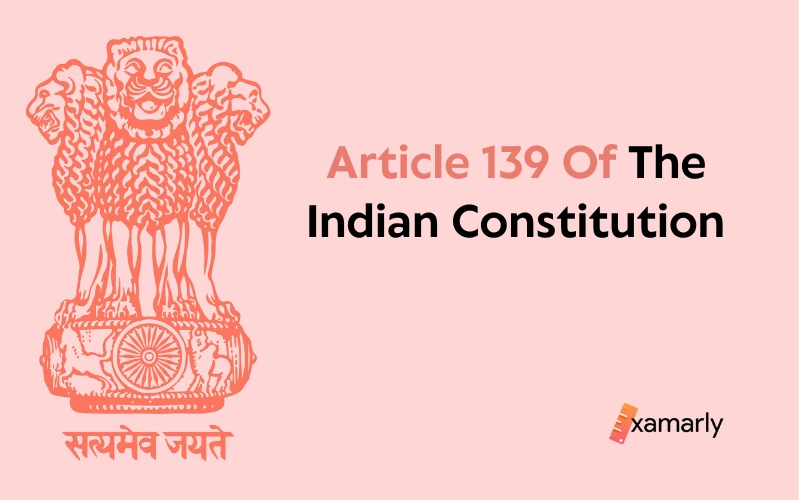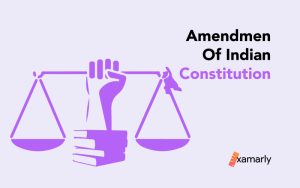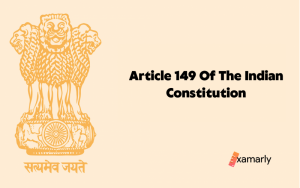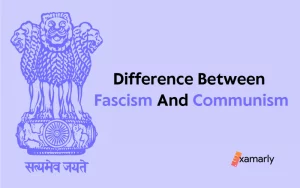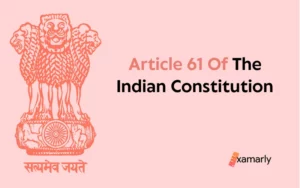The term “writ” refers to a written order issued by either the Supreme Court or the High Court of India. For Indian individuals whose fundamental rights have been violated, these orders mandate constitutional remedies.
A special writ-issuing authority granted to the Supreme Court is covered under the constitutional provisions of Article 139 of the Indian Constitution.
The said Article is detailed in Chapter IV of Part V of the Indian Constitution.
This post revolves around Articles 139 and 139A of the Constitution. This is a part of the Indian Polity of the IAS Syllabus and so is beneficial for the preparation for IAS Exam.
What Is Article 139 Of The Indian Constitution
The constitutional provision of Article 139 is as follows:
The ability to issue orders, directions, or writs, including writs in the type of habeas corpus, prohibition, quo- warranto, mandamus, and certiorari, or any one of them, is one of the judicial functions that can be delegated to the Supreme Court by statute from Parliament. However, this power cannot be used for any of the purposes listed in clause (2) of article 32 of the Constitution.
Article 139A
The framers of the Indian Constitution have provided wide powers under Article 139A to the Apex Court.
- When cases encompassing the same or substantially the same questions of law are awaiting before the Supreme Court and one or more High Courts, or before two or more High Courts and the Supreme Court determines, either of its own accord or in answer to an application made by the Attorney-General of India or by a party to any such case, that the matters in question are significant issues of national importance, the Supreme Court may withdraw the case:
With the caveat that the Supreme Court may, after ruling on the said questions of law return a copy of its decision to the High Court from which the case was withdrawn along with any such withdrawn case. Upon receiving it, the High Court will proceed to decide the case in accordance with the ruling. - Any case, appeal, or other procedure that is pending before any High Court may be transferred to another High Court by the Supreme Court if it determines that doing so will further the interests of justice.
Synopsis Of Article139A
In accordance with the objectives of the 42nd Constitutional Amendment, Article 139A was drafted and included in the constitution. With regard to determining whether central laws are constitutional, the Amendment proposed giving the Supreme Court exclusive jurisdiction.
If the circumstances outlined in Article 139A are met, litigants may approach the Apex Court to request a transfer of proceedings. It wasn’t meant to limit the expansive powers granted by Articles 136 and 142 of the Constitution, and it didn’t work that way either.
The ability to withdraw from and transfer cases to the Apex Court must be deemed to have not been exhausted if, in the view of the Court, it is required to carry out the high aim of Articles 136 and 142(1).
According to Article 139A(2), the Supreme Court has the authority to transfer any case that is pending before one High Court to another High Court.
Check out the linked articles to learn about other articles for the UPSC preparation of Indian Polity.
Difference Between Article 139 And Article 32
| Article 32 Of The Constitution Of India | Article 139 Of The Constitution Of India |
| Remedies for enforcing rights granted by Part III are covered in Article 32 of the Constitution. | The Constitution’s Article 139 addresses the grant of specific writ-issuing authority to the Supreme Court. |
| According to Article 32 (2) of the Constitution, the Supreme Court may be requested to act by issuing writs in the forms of habeas corpus, mandamus, prohibition, quo warranto, and certiorari as may be necessary for the enforcement of fundamental rights. | Under the framework of the Constitution, writs, orders, and directions were reserved for the High Courts (Article 226), but Article 139 allows Parliament to place by law additional power on the Supreme Court to issue these documents for purposes other than the enforcement of fundamental rights. |
| The 42nd amendment of the Indian Constitution has revised Article 32. | 42nd amendment and 44th amendment of the Indian Constitution have revised Article 139. |
Case
A High Court or many High Courts may transfer some cases to the Supreme Court under Article 139A. In light of the fact that the Supreme Court and the High Courts have concurrent jurisdiction over certain issues, such as those that concern fundamental rights, the Supreme Court, in the case of Sunil Rathee & Ors. v The State of Haryana & Ors., addressed the conditions under which this power of transfer may be exercised as well as the situations under which it may be applied.
The petitioners in Sunil Rathee asserted that the rule in Indra Sawhney v. Union of India [2009] breaches the requirement for a 10% quota for the Economically Weaker Sections in public services and filed a writ petition with the Punjab and Haryana High Court. Later, they filed an appeal asking that their case be sent to the Supreme Court, where, according to them, a case involving identical issues to theirs was ongoing (State of Gujarat and Ors. v. Ms. Dulari Mahesh Basagre & Anr. [2016]). The State objected to this transfer in a number of ways.
Conclusion
The Indian Supreme Court is the guardian of the people’s fundamental rights. It possesses original jurisdiction and extensive powers for that. For the purpose of upholding citizens’ fundamental rights, it issues five different types of writs.
Article 139 bestowed upon the Supreme Court of Inda a specific writ issuing power that does not belong to the second clause of Article 32.
FAQs On Article 139
Which Amendmendment Has Amended Article 139A?
42nd and 44th amendments have amended Article 139A of the Constitution of India. The 42nd amendment has inserted Article 139A into the Constitution while the 44th amendment has amended clause 1 of the said Article.
What Article 139 Deals With?
Article 139 of the Constitution of India specifies that the Supreme Court has the exclusive power to issue writs in certain circumstances. In the year 1976 42nd amendment inserted Article 139A into the constitution which centers around the transfer of certain cases.
What Is Clause 2 Of Article 32?
The Supreme Court shall have the authority to issue any necessary directives, orders, or writs, including writs of mandamus, certiorari, prohibition, habeas corpus, and quo warranto, as may be necessary to enforce any of the rights granted by Part III.
What Are Writs?
The word “writ” is used to describe a written order that has been handed down by either the Supreme Court or the High Court of India. These decisions mandate constitutional remedies for Indian citizens whose fundamental rights have been infringed. Writs are classified into five different categories and these are as follows:
1. Habeas Corpus
2. Certiorari
3. Mandamus
4. Quo-Warranto
5. Prohibition
Apart From Article 139, Which Other Articles Of The Constitution Deal With Writs?
Apart from Article 139, Articles 32, and 226 deal with writs issuing authority. While the High Court has the same authority under Article 226 of the Indian Constitution, the Supreme Court has that authority under Article 32.


